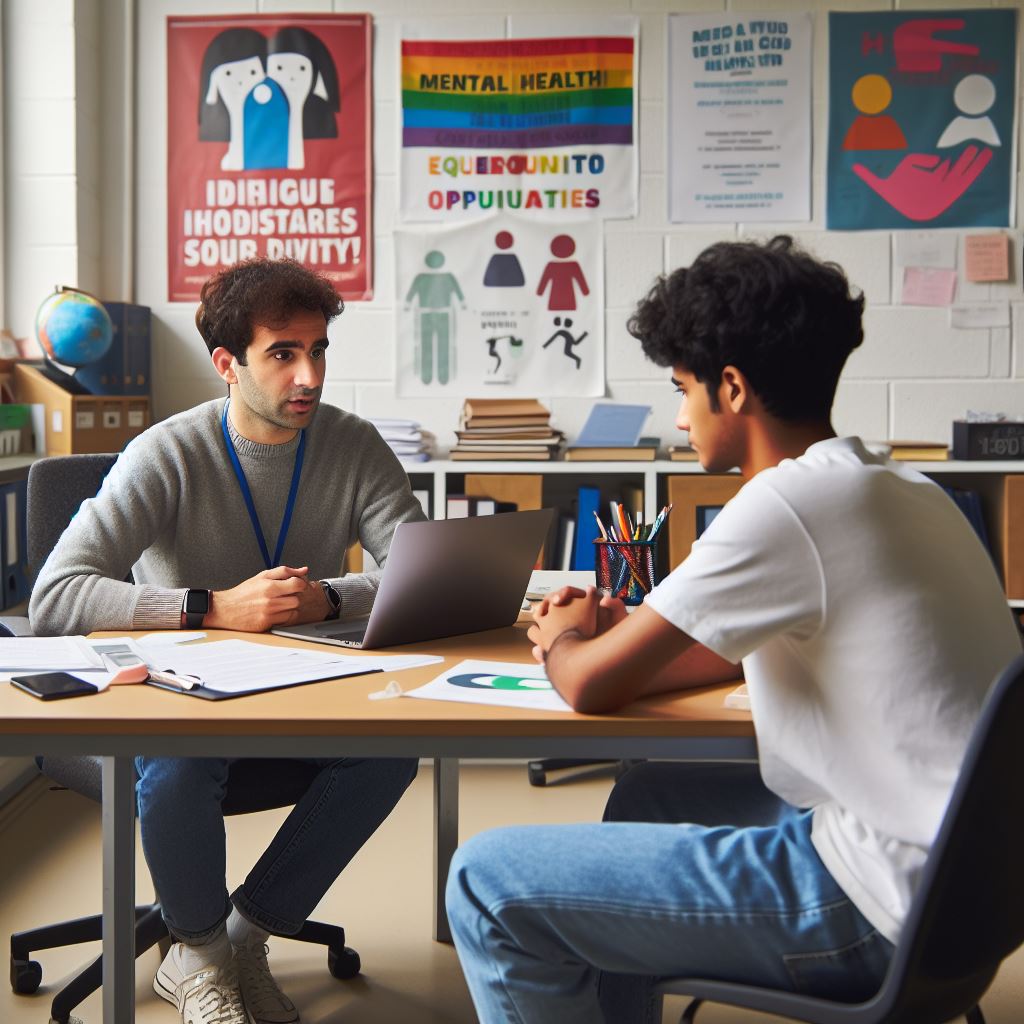Introduction
Exploring “School Counselors Advocacy” is key to ensuring that students have the necessary resources and support to thrive in all aspects of their lives.
Imagine a world where every student has access to the support they need to succeed academically, emotionally, and socially.
Where their well-being and future prospects are prioritized.
School counseling is a profession that focuses on supporting students’ personal, social, and academic growth.
Counselors provide guidance, counseling, and resources to help students overcome challenges and achieve their goals.
School counselors act as advocates, ensuring that students have the necessary resources and support to thrive in all aspects of their lives.
They work collaboratively with students, teachers, and families to promote positive change and remove barriers to success.
Research shows that students who have access to a school counselor are more likely to graduate, have improved behavior, and perform better academically.
Counselors help students develop essential life skills, such as problem-solving, decision-making, and goal-setting.
Additionally, counselors play a critical role in identifying and addressing mental health issues, ensuring students receive appropriate interventions and support.
They advocate for inclusive and equitable education, working to eliminate biases and provide equal opportunities for all students.
In essence, school counselors are essential advocates for students’ well-being, academic success, and future prospects.
Through their dedication, support, and advocacy, they make a lasting difference in students’ lives, empowering them to overcome challenges and achieve their full potential.
They are an invaluable asset in shaping a brighter future for our youth.
Importance of Advocacy
Advocacy in the context of school counseling
Advocacy in school counseling refers to the act of supporting and promoting students’ rights and needs.
It involves actively speaking up for students, empowering them, and ensuring their voices are heard.
School counselors advocate for students by addressing concerns, providing resources, and facilitating access to necessary services.
Why advocacy is crucial for students’ educational journey
- Advocacy plays a critical role in helping students overcome various obstacles they may face in their educational journey.
- By advocating for students, school counselors help ensure they receive equal opportunities and resources.
- Advocacy enables students to navigate the complexities of the education system, fostering their personal and academic growth.
Positive impact advocacy can have on student outcomes
- Advocacy can have a transformative effect on student outcomes, leading to improved academic performance.
- When school counselors advocate for students, they help create a supportive and inclusive environment.
- This, in turn, enhances students’ motivation, self-confidence, and engagement in their education.
- Advocacy also promotes social-emotional development, as students feel valued and supported in their educational endeavors.
- Furthermore, advocacy can contribute to reducing disparities and ensuring equitable educational opportunities for all students.
Read: Challenges and Rewards: School Counseling Perspectives
The Advocacy Role of School Counselors
Advocacy is an essential aspect of the role of school counselors. By actively advocating for their students, these professionals can make a significant difference in their lives.
The advocacy role encompasses various areas, including collaboration, addressing barriers, promoting equity, and assisting with career development and postsecondary planning.
Transform Your Career Today
Unlock a personalized career strategy that drives real results. Get tailored advice and a roadmap designed just for you.
Start NowCollaboration with students, parents, teachers, and administrators
One of the key aspects of the advocacy role is collaboration.
School counselors work closely with students, parents, teachers, and administrators to ensure the success and well-being of their students.
- Building relationships and earning trust: The counselors understand the importance of building positive relationships with their students.
By creating a safe and trusting environment, they can effectively support and advocate for their students. - Establishing effective lines of communication: Efficient communication is essential in advocating for students.
School counselors establish open lines of communication with all stakeholders involved, enabling effective collaboration and problem-solving.
Identifying and addressing barriers to student success
Advocacy also involves identifying and addressing barriers that hinder student success.
School counselors actively work towards removing these obstacles and promoting a conducive learning environment.
- Advocating for resources and support services: Counselors advocate for resources and support services to address the individual needs of their students effectively.
They collaborate with community agencies and organizations to ensure students receive the help they require. - Assisting with access to academic opportunities, financial aid, and scholarships: School counselors are pivotal in helping students access academic opportunities and financial aid programs.
They ensure students are aware of scholarship opportunities and guide them through the application process.
Promoting equity and inclusivity
School counselors actively promote equity and inclusivity within their school communities.
They aim to eliminate biases, stereotypes, and systemic barriers that may prevent students from reaching their full potential.
- Addressing biases and stereotypes: Counselors challenge biases and stereotypes by fostering a culture of inclusivity and acceptance.
They educate students and staff on the importance of respect and understanding for diverse backgrounds and viewpoints. - Advocating for culturally responsive practices: Advocating for culturally responsive practices, school counselors ensure the school environment meets the needs of all students effectively.
They work with educators to create inclusive curricula and teaching strategies that celebrate diversity.
Assisting with career development and postsecondary planning
Another crucial aspect of the advocacy role is assisting students with career development and postsecondary planning.
School counselors guide students through the process, equipping them with necessary skills and resources for their future endeavors.
- Advocating for career exploration opportunities: Counselors advocate for career exploration opportunities within the school curriculum and community.
They organize career fairs, invite guest speakers, and provide guidance on internships and experiential learning. - Supporting college application and financial aid processes: School counselors support students in navigating the college application process.
They offer guidance on selecting suitable colleges, preparing applications, and securing financial aid to make higher education more accessible.
Read: How School Counselors Impact Mental Health in Schools

Examples of Successful School Counselor Advocacy
First Case study: Secure funding for a new mental health program
In Case study 1, the school counselor was faced with the challenge of securing funding for a new mental health program.
o address this, the counselor took action and explained the situation to stakeholders, highlighting the importance of addressing students’ mental health.
The counselor intervened by presenting a comprehensive proposal, outlining potential benefits, and emphasizing the positive impact on students’ well-being.
As a result, the school recognized the significance of the program and allocated the necessary funding.
The implementation of the mental health program had a transformative effect on students’ mental well-being.
By providing access to counseling services, support groups, and resources, students experienced improved overall mental health.
This positive impact extended beyond the emotional well-being of students and also positively influenced their academic performance.
Students who had previously struggled with their mental health were now better equipped to focus on their studies, resulting in improved grades and increased engagement in class.
Second Case Study: Advocating Equal Access to Advanced Courses
In Case study 2, the school counselor advocated for equal access to advanced courses for underrepresented students.
The counselor identified disparities in advanced course opportunities for certain students, limiting their educational and career prospects.
To address this, the counselor developed an advocacy strategy, collaborating with teachers and administrators to identify barriers for underrepresented students.
Transform Your Career Today
Unlock a personalized career strategy that drives real results. Get tailored advice and a roadmap designed just for you.
Start NowThrough the counselor’s advocacy efforts, barriers such as implicit biases and lack of information were addressed.
As a result, underrepresented students were given increased opportunities to take advanced courses.
This not only empowered the students but also provided them with a more equitable educational experience.
Access to rigorous coursework empowers students to academically challenge themselves, enhance skills, and boost success in higher education and beyond.
Third Case Study: Advocating for Special Needs Students
- The counselor advocated for students with special needs, emphasizing collaboration with parents, teachers, and administrators to secure essential support for their success.
- The counselor fostered open communication, shared resources, and encouraged collaboration with all stakeholders to meet the unique needs of students.
- The counselor’s collaboration with parents, teachers, and administrators resulted in significant improvements in the education of students with special needs.
- Ensuring necessary accommodations and support, the students’ educational experience became more inclusive, empowering, and tailored to their needs.
- This led to increased academic achievement, improved social and emotional development, and a greater sense of belonging within the school community.
Overall, these case studies highlight the impactful work that school counselors can achieve through advocacy.
Actively advocating for mental health program funding, equal access to advanced courses, and students with special needs, counselors significantly impact students’ lives.
Their efforts lead to improved mental well-being, increased opportunities, and a more inclusive and supportive educational environment.
Read: Advanced Degrees for School Counselors: Are They Worth It?
Challenges and Solutions for School Counselor Advocacy
School counselors actively face challenges in advocacy. This section explores these challenges and suggests solutions for overcoming them.
Lack of resources and funding
- Lack of resources and funding can significantly hinder school counselors’ advocacy efforts.
- Without adequate resources, it becomes challenging to implement effective programs and initiatives to support students’ needs.
- To address this challenge, school counselors can actively engage in fundraising strategies.
- They can organize events, seek sponsorship from local businesses, or even apply for grants to secure additional funding.
- Moreover, advocating for alternative resource allocation within the school or district can also help redirect resources towards counseling services.
Resistance to change or limited support from stakeholders
Another challenge school counselors often face is resistance to change or limited support from stakeholders such as administrators, teachers, and parents.
This resistance can hinder the implementation of new counseling programs or initiatives.
To overcome this challenge, school counselors need to address potential obstacles head-on.
They can communicate the benefits of the proposed changes and provide evidence-based research to support their advocacy efforts.
It is crucial to build relationships and establish effective communication channels with stakeholders to gain their support.
Highlighting the importance of school counselor advocacy is also key.
Showcasing counseling program impacts and promoting their value, school counselors shift stakeholders’ perspectives, garnering more support for advocacy initiatives.
Overwhelming workload and time constraints
- School counselors grapple with overwhelming workloads, from individual counseling to presentations and administrative tasks, facing significant time constraints.
- This can hinder their ability to advocate effectively.
- To manage their workload, school counselors can explore time management strategies such as prioritizing tasks, delegation, and setting boundaries.
- By identifying and focusing on high-priority activities, they can allocate their time more efficiently and ensure that advocacy efforts receive the attention they deserve.
- Collaboration among school counselors is crucial in alleviating workload pressures.
- By sharing responsibilities and working as a team, counselors can distribute the workload more effectively.
- Creating counseling teams fosters collaboration, offering a supportive network for counselors to share resources and seek assistance when needed.
Most importantly, school counselor advocacy encounters challenges like resource constraints, limited funding, stakeholder resistance, and overwhelming workloads.
Implementing fundraising, addressing obstacles, advocating value, and utilizing time management and collaboration, counselors overcome challenges to make a lasting impact on students’ lives.
Read: Differences Between School Counselors and Psychologists
Conclusion
The importance and impact of school counselor advocacy cannot be ignored.
Transform Your Career Today
Unlock a personalized career strategy that drives real results. Get tailored advice and a roadmap designed just for you.
Start NowThey have the power to make a difference in students’ lives by advocating for their needs and supporting their overall well-being.
Through their dedication and unwavering commitment, school counselors create a positive and nurturing environment that helps students thrive.
As we reflect on the role of school counselors, we realize the profound impact they have on the educational journey of students.
They are not just counselors; they are advocates, mentors, and champions for students’ success.
Recognizing challenges and advocating for resources, school counselors empower students to overcome obstacles and reach their full potential.
Lastly, we encourage all school counselors to continue advocating for students’ well-being and success.
Your advocacy efforts make a remarkable difference in the lives of students, ensuring they receive the support they need to thrive academically, emotionally, and socially.
Keep pushing for positive change and never underestimate the power of your advocacy to transform lives.
[E-Books for Sale]
The Big Book of 500 High-Paying Jobs in America: Unlock Your Earning Potential
$19.99 • 500 High-Paying Jobs • 330 pages
Explore 500 high-paying jobs in America and learn how to boost your career, earn more, and achieve success!
See All 500 High-Paying Jobs of this E-Book
1001 Professions Without a Degree: High-Paying American Jobs You Can Start Now
$19.99 • 1001 Professions Without a Degree • 174 pages
Discover 1001 high-paying jobs without a degree! Unlock career tips, skills, and success strategies for just $19.99!




